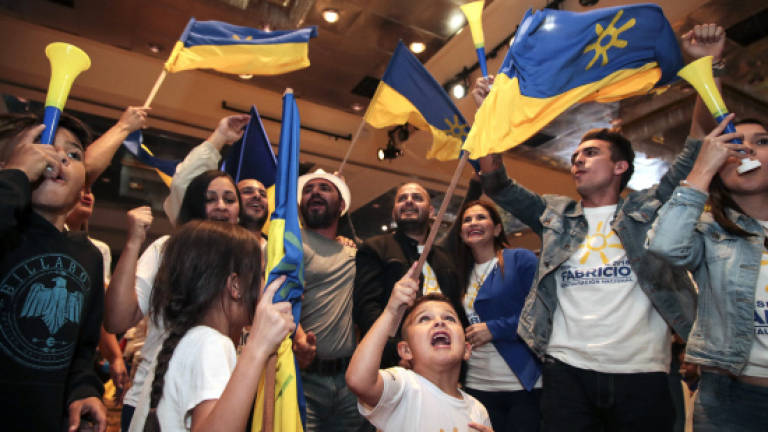Anti-gay marriage pastor in Costa Rica presidential runoff

SAN JOSÉ: Costa Rica faces a choice between a right-wing evangelical lawmaker and a former minister from the leftist ruling party for its next president after a first-round weekend election.
Sunday's vote winnowed a crowded field of 13 to the two frontrunners, who will face off in an April 1 knockout election.
The winner will take the helm of the small Central American country, a significant tourist destination that boasts pristine tropical beaches and is big on protecting the environment.
The politician who came in first is Fabricio Alvarado, a 43-year-old lawmaker with the National Restoration Party who is also a pastor and a singer. He took 25 percent of the ballots.
He emerged from obscurity to lead the pack by vociferously opposing gay marriage, tapping into voters' social conservatism and adherence to Christian dogma.
The issue has been brought to the fore after the Inter-American Court of Human Rights, which is hosted in Costa Rica, urged Latin American nations to recognize same-sex marriage.
Several big countries in the region — Argentina, Brazil, and Colombia — already have adopted such policies, but Central America has resisted the trend.
Alvarado's close rival is Carlos Alvarado, a 38-year-old former labor minister from the ruling Citizens' Action Party who scored 22 percent of the vote. Despite the shared last name, the two men are unrelated.
The younger Alvarado is promising continuity with outgoing President Luis Guillermo Solis, who was barred constitutionally from seeking re-election.
Religion plays key role
"There is no doubt religion lifted Fabricio Alvarado, and that snowballed with vehemence after the (Inter-American) court's resolution," said political analyst Jorge Vega.
Poll observers from the Organization of American States said that the gay marriage issue had dominated the election debate, and urged the candidates to speak of other governance topics going forward.
"The mission hopes the political rights of (sexually diverse) persons will not be affected because of the polarization generated in the campaign through the discussion on same-sex marriage," said the head of the observers' delegation, former Colombian president Andres Pastrana.
In his victory speech to supporters, Fabricio Alvarado said voters had delivered a clear message that "Costa Rica doesn't want more of the same."
"It's for this that I am joining a movement of solidarity, values, of innovation and of genuine progress," he added.
Carlos Alvarado separately appealed for national unity to tackle several challenges facing the country, including in education, the economy, security and climate change.
Sunday's election, which also chose a new legislature, revealed disenchantment with Costa Rica's two main traditional mainstream parties, the centrist National Liberation Party and the center-right Social Christian Unity Party.
Neither of their candidates made it through to the presidential runoff.
"The country has changed," said Felipe Alpizar, of the Center for Political Research and Studies at the University of Costa Rica.
"Politically, the country is different, and we must pay attention to that."
'Anti-establishment sentiment'
Voter surveys by Alpizar's center showed Fabricio Alvarado got an electoral lift after criticizing the Inter-American Court and suggesting that Costa Rica withdraw from it as he hammered away against homosexual marriage.
Vega noted that the pastor's National Restoration Party had made inroads in rural areas, where poorer segments of the population live, and where unemployment and religious observance are higher.
He said each of the two candidates would now have to woo other parties to their side to amass enough votes for victory, and to ensure a legislative majority to back their agendas.
Eurasia, a political analysis firm, said in a briefing note that "Fabricio will have an edge in the second round because of his ability to capture antiestablishment sentiment and lure other conservative voters, while Carlos will have to defend the current president's mixed record, including on corruption."
A victory for Fabricio Alvarado would dampen the outlook for reforms to tackle the country's deficit.
"The runoff will likely be competitive, and with two months until the vote, election dynamics can change quite a bit," Eurasia said. — AFP